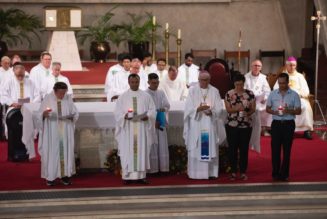By Phil Lawler ( bio – articles – email ) | Aug 09, 2022
Four years have passed since Theodore McCarrick resigned from the College of Cardinals. We are still coping with the aftershocks of the scandal he caused. Moreover—the reason I write about this subject today—we are still coping with the clerical system that allowed that scandal to fester unchecked for so many years.
A few months after his resignation, the Vatican announced that McCarrick had been stripped of his clerical status. A canonical trial had found him guilty—not only of sexual abuse, but of soliciting in the confessional and abusing his episcopal authority as well.
Since that time, Pope Francis has named five bishops from the US to the College of Cardinals. Barring a dramatic last-minute change, Bishop Robert McElroy of San Diego will soon join Cardinals Cupich, Tobin, Farrell, and Gregory. All five have had close connections with McCarrick.
Leila Miller, a fearless Catholic author, is trying to bring about a dramatic last-minute change in this story. On her blog she is urging lay Catholics to write to Bishop McElroy, asking him not to accept the red hat. She concedes that she has “no illusion that anything we or others expose to the public will stop McElroy’s ascent, but that doesn’t negate our obligation to try.”
The case against Bishop McElroy is not limited to complaints that he downplayed sex-abuse reports, Miller notes. He also ignored a detailed report on sexual abuse by McCarrick and other prelates, handed to him in 2016—six years before that scandal became public. When he arrived in San Diego, pledging that no predatory priest would remain in ministry in his diocese, he failed to apply that policy to Jacob Bertrand, a priest who had molested a young woman in an act that was blasphemous, felonious, and almost certainly Satanic. A Wall Street Journal column on the case observes that if it were not for state prosecutors, “Father Bertrand might still be in ministry.”
“The Diocese of San Diego never reached out to me,” the victim reports. The diocese received a report on the Satanic abuse in 2014, and took no immediate action. On the contrary, when the victim took her case to civil law-enforcement officials, diocesan lawyers balked at prosecutors’ requests for the accused priest’s records. Only much later would the Church take action, remove Bertrand from priestly ministry, and finally defrock him.
Maybe there is an explanation for Bishop McElroy’s failure to act quickly in this case—although it is very difficult to imagine why a bishop would hesitate to act when a priest is credibly accused of Satanism. Maybe there is an explanation for why he did not meet with Richard Sipe, the researcher who had documented evidence against McCarrick, or with the woman who was subjected to the outrageous Satanic abuse. But on the very best reading, his actions (or rather his inaction) have contributed to a climate of scandal that still afflicts our Church, and to the cynicism of lay Catholics who question whether our bishops are ready to police themselves.
Still I know, and you know, and Leila Miller knows, that Bishop McElroy will receive his red hat in a few weeks, undeterred by our protests. So why raise the issue now?
- Because four years after McCarrick resigned his position, and despite many promises of transparency, we still do not have a full accounting of how he rose to such power and prominence, and how he remained in power even after his misconduct became a matter of common knowledge. Neither the Vatican nor the American hierarchy have seen fit to answer the obvious questions: Who knew, and when did they know, and why didn’t they act?
- Because Pope Francis, despite his rhetoric about cleaning up the scandal, still has not named an American cardinal who is not deeply stained by that scandal.
- Because sometime in the not-too-distant future, the cardinals will be gathered in conclave to select a new Sovereign Pontiff, and it’s chilling to think that some of the cardinal-electors may be vulnerable to blackmail.
This week’s headlines included the news that mediation failed to produce a settlement in a lawsuit brought by one of McCarrick’s abuse victims. That case is now likely to go to trial, with the Archdiocese of Newark (home of Cardinal Tobin) and the Diocese of Metuchen as defendants alongside McCarrick. The disgraced 92-year-old former cardinal also faces a September hearing in a separate criminal case. The ugly facts of the case will be rehashed yet again—no doubt supplemented by new details, which are unlikely to bolster confidence in the Catholic hierarchy. This scandal is not going away.
Sound Off! CatholicCulture.org supporters weigh in.
All comments are moderated. To lighten our editing burden, only current donors are allowed to Sound Off. If you are a current donor, log in to see the comment form; otherwise please support our work, and Sound Off!

Join Our Telegram Group : Salvation & Prosperity








